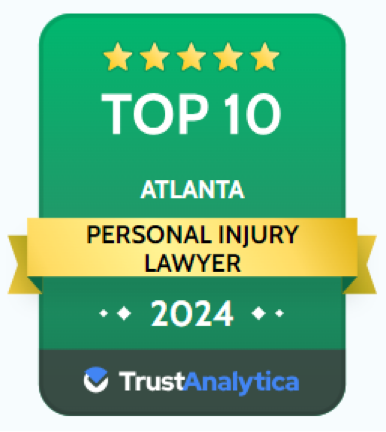All information provided about the law is very general in nature and should not be relied upon as legal advice. Every situation is different and should be analyzed by a lawyer who can provide individualized advice based on the facts involved in your unique situation, and a consideration of all of the nuances of the statutes and case law that apply at the time.
How do I report a dangerous driver in Georgia?
If you see someone driving recklessly, including swerving, speeding, texting, or behaving aggressively, you should call 911.
Remember only to call 911 if you feel the driver is posing a danger, as 911 is intended for truly urgent situations. It should not be used for simple motor vehicle violations but instead can be used if the driver’s behavior presents a danger to the public or places people in harm’s way.
If you do call 911, be sure to pull over first to stay safe and not become a danger to others. Tell the operator your location, the vehicle’s description, and their travel direction. Do not attempt to follow the car or take cell phone pictures, as these actions could increase the hazards of the situation. Remember, Georgia has a Hands Free Driving law to maintain safe roads for everyone. Be cautious and maintain a safe following distance from the dangerous driver.
If you can safely record the license plate number, state of origin, vehicle make, model, and color, this will be useful for the police to locate the offender. Before the officer dispatched can take any action, they will need to either observe a violation or receive a witness report as to a violation, which can be your 911 call.
Unsafe Driver Investigations
If you know of a driver that you feel is medically or mentally unfit to drive, such as an elderly person or someone you know to be abusing substances, you can file a request to evaluate the driver. The Georgia Department of Driver Services (DDS) accepts evaluation requests from relatives, physicians, caregivers, law enforcement officers, vision specialists, and others with personal knowledge of the individual’s potential unfitness. You must mail a form to the appropriate office to request a driver review. Anonymous reports are not accepted. However, you can ask that your information be kept confidential.
If you or a loved one are dealing with injuries from an incident with a dangerous or aggressive driver, contact an experienced Car Accident Attorney in Atlanta at Montlick– call us at 1 (800) 529-6333.
What information will be helpful to the police?
If you’ve spotted an aggressive driver and are concerned for the safety of yourself and others on the road, there are a few factors to note that will be helpful to the police. When reporting dangerous driving to Georgia’s How’s My Driving program, provide as much information as possible about the vehicle, including the license plate number, color, model, and distinguishable markings. It’s also important to share any details about the driver that you can, such as if they were a man or woman, hair color, other physical attributes, and if there were others in the car with them. It may also be helpful to note any elements that could have contributed to the dangerous driving, such as missing traffic signals, racing, or other speeding vehicles.
It’s essential to understand how to report dangerous driving. When reporting dangerous drivers, remember to share the time of day the incident occurred, its location, and the circumstances surrounding it.
The state of Georgia offers a way to report government employees who are driving state vehicles dangerously. When witnessing unsafe driving of a state vehicle in Georgia, pay attention to any branding on the car as it will be an important identifier. If you need to report a state of Georgia employee driving a state-owned vehicle, you can contact the Report My Driving program at 888-576-9785 once you’ve safely pulled over.
What is considered reckless driving in Georgia?
Under Georgia Code § 40-6-390, reckless driving is committed by a person who “drives any vehicle in reckless disregard for the safety of persons or property.” Examples of careless driving include speeding, running red lights or stop signs, tailgating, weaving in and out of traffic, racing, driving under the influence, and failing to yield. Some of these examples fall under aggressive driving, but remember that they are not the same thing.
Under Code § 40-6-397 in Georgia, reckless driving is defined as a person operating their vehicle intending to “harass, annoy, obstruct, or intimidate other drivers, passengers, cyclists, or pedestrians.” However, a motorist can be charged with reckless and aggressive driving for the same incident. Reckless and aggressive driving in Georgia may have serious consequences, such as horrible accidents, bad injuries, lifelong suffering, or even death.
Is drunk driving the same as reckless driving? Here’s what you should know.
Drunk driving is not the same as reckless driving, though it is very reckless. The main difference between a drunk and reckless driver is cognitive abilities– a drunk driver may forget to signal, poorly judge distances between vehicles, or cross the center line. While a reckless driver will drive erratically, at high speeds, putting others in danger, their senses have not been dulled by alcohol. The charges also differ. Driving recklessly will most likely result in a fine, while drunk driving could face additional criminal charges.
However, a DUI can be reduced to a reckless driving penalty if the case meets specific requirements.
There are pros and cons of this:
- DUIs stay on your driving and criminal record for life, BUT a reckless driving offense is a traffic offense
- If you are under 21, a reduction will save your license from being suspended, BUT if the four points mean you’ll have 15 or more on your MVR, it will still be suspended
- A reckless driving offense is less for your insurance than a DUI, BUT it will still affect your rates
- Though reckless driving carries the same type of penalties as a DUI, it will have a lesser long-term effect
Reckless driving penalties
Is reckless driving in Georgia a misdemeanor? The short answer is yes. A careless driver is guilty of a misdemeanor and will receive either a fine less than $1,000, face imprisonment that does not exceed 12 months, or both. Ultimately, court costs may be added, costing more than $1,000.
An officer can arrest a reckless driver, but this will most likely not occur if no one is injured. However, if the driver attempts to flee, the fines will increase, and jail time is likely. If they have caused injury to someone else or death, charges might change to a felony, which could result in prison time.. A reckless driving charge will add 4 points to your license and be reported to the Department of Driver Services (DDS), entering your permanent record. If you are under 21, your license may be suspended as well.
Reckless driving leading to fatal crashes in GA is rising.
The Georgia Department of Transportation (GDOT) has released a study showing the startling increase in aggressive driving that has led to fatal crashes over the last decade. GDOT reported doubling fatal crashes, stating distractions as the most significant contributing factor. A lack of focus is to blame, according to the study and an interview conducted with Marietta police officer Chuck Bellamy.
Failing to follow phone laws has become a serious problem, leading to a failure to follow speed limits and traffic signals. GDOT showed that 26 counties saw twice as many fatal crashes as the years prior to 2021, stating the COVID-19 pandemic as the cause for the increase.
Texting and driving: the most common form of reckless driving
Unsurprisingly, using a cell phone while driving significantly increases the risk of an accident. It can be tempting to send a quick text; it’ll only take a few seconds, right? But those few seconds could cost you or someone else their life. Texting while driving is one of the most dangerous forms of reckless driving and can seriously impact your driving record and insurance if you are in a crash.
The likelihood of a crash occurring when dialing a cell phone increased the risk by 2.8% while reaching for an object increased the risk by 1.4%. Talking on the phone was 1.3 times higher than someone not on the phone. For drivers of a large truck or heavy vehicle, texting increased risk by 23.2%, reaching for a telephone increased danger by 6.7%, dialing increased it by 5.9%, and talking on the phone was a 1.0 times higher risk.
Montlick’s Efforts to End Distracted Driving
In an attempt to combat reckless driving in Georgia, Montlick helped push the state to enact the Hands Free Law in 2018, setting strict limits, fines, and points against insurance if caught using the phone while driving. During the year-long effort to make Georgia hands-free, Montlick was there from the start, working closely with state leaders, law makers, advocates and family members who have lost a loved one to a distracted driver. Our efforts paid off. Today, the Office of Highway Safety states that drivers cannot have a phone in their hand or touch any part of their body while driving, “Even with hands-free technology, drivers cannot write, read or send text messages, e-mails, social media content, and other internet data while on the road.” However, voice-to-text messages are allowed. Drivers may also listen to music as long as there are no videos on their screens– screens are only to be used for GPS navigation.
According to Georgia Code §40-5-57, drivers face a potential conviction, a fine, and points against their license if caught with a phone. The first conviction’s fine is $50 and 1 point, the second $100 and 2 points, and the third $150 with 3 points. Drivers risk losing their licenses over this type of reckless driving if enough points are reached, as well as additional fines and tickets. The only exceptions to this rule are to report:
- An accident
- A medical emergency
- Criminal activity
- A fire
The other exception applies to utility service providers, police, firefighters, and EMTs, who may only use their phones when necessary. Remember that you are still considered to be driving when stopped but not parked. Pull off the road if you need to operate your cell phone.
Proving the use of a cell phone can be challenging. In most cases, your attorney will attempt to subpoena phone records to see when the last call and text were sent. They may also try to get ahold of the name, address, and other information attached to the number to hold them accountable for the accident. If found at fault for causing the crash, you can be held financially responsible for injuries or damages caused to others and their property. The best way to ensure this doesn’t happen is to avoid driving recklessly at all costs and leave your phone tucked away, out of reach. If you see another driver using their phone, report their dangerous driving. You may just save a life.
Aggressive driving in the news
If you pay attention to the news, you’ve most likely noticed increased reported aggressive driving incidents in Atlanta. Recent statistics published by Forbes have designated The A as the most dangerous city to drive in in the U.S. The likelihood of getting into an accident in Atlanta is 49.5%, with an average of more than 15 fatalities per 100,000 people. An article published by Axios Atlanta cited fewer drivers during the COVID-19 pandemic as part of the problem, as it set a dangerous precedent for reckless driving with minimal consequences. With less busy roads, drivers felt it was easier to speed– and those bad habits have lingered.
The uptick in reckless driving in Georgia can be linked to three main factors: speeding, distracted driving, and road rage. According to the National Highway Transportation and Safety Administration (NHTSA), speeding is involved in one-third of all motor vehicle deaths, with road rage making up two-thirds. In aggressive driving and road rage incidents, over a third involved firearms. Distractions while driving, such as smartphones, play a significant role in crashes, along with physical or cognitive distractions, such as conversations or passengers.
Why do people drive dangerously or aggressively?
It’s normal to experience a little bit of anger or anxiety when driving, but when that anger spirals out of control, it creates a dangerous situation for everyone on the roads. If you’re a driving adult, you’ve probably seen someone toss up the middle finger, beeping and speeding past you.
For some people, getting angry enough to put others’ lives at risk is incomprehensible. It may be hard for most citizens to understand what could provoke someone to behave so carelessly.
Here are some possible causes of road rage based on what we do know:
Being prone to anger
Research in the U.S. suggests that people who are prone to bouts of anger and rage tend to carry that into their driving. However, there are also situations where those who are naturally calm can still get angry on the road.
Feeling protected by anonymity
One possible reason people show extreme anger while driving is because they may feel anonymous. Without the burden of being recognized, they may feel more free to express the uglier sides of their personality.
Going through a stressful period
A recent study compared coping styles and how they relate to people’s driving. Those who tended to take a problem-solving approach to stress were less likely to demonstrate road rage. Those who typically have a more emotional response to stress were more likely to experience outsized rage while driving.
Mental health conditions
People with road rage often also have psychological conditions such as substance abuse disorder or other comorbid mental health conditions. Of course, this doesn’t mean that mental health problems always lead to road rage.
Getting stuck in traffic
Traffic is frustrating even for the most zen of us, but for people prone to road rage, it may also trigger more aggressive behaviors. A few studies show that running late and traffic congestion can cause people to be reckless and speed.
Protect yourself from aggressive drivers with these defensive driving tips.
We’ve all witnessed dangerous, unpredictable drivers. When you encounter one, it’s scary and can make you feel on edge, increasing the dangers of driving. Even with speed limits and indicators on the roads, some people will still ignore them and drive recklessly. Learning to be a defensive driver can mean the difference between making it home safely and visiting the hospital.
What is defensive driving?
According to Progressive, defensive driving is a set of safe responses to potential hazards, including other drivers, damaged road surfaces, debris, inclement weather, and more that can help keep you and other drivers safe. Being a defensive driver reduces your risk of accidents, keeps you safe, enables you to avoid traffic violations, and saves you money on car insurance. Some states, Georgia included, offer defensive driving courses which can lower your rates. Other benefits of defensive driving include:
- Using less fuel
- Anticipating dangerous situations and avoiding risks
- Lower stress levels
- Avoiding road rage
- And more
How can I learn to be a defensive driver?
To start, stay updated on road safety practices and monitor traffic changes in your area. Improving as a defensive driver means prioritizing safe driving by taking your time. Don’t allow other drivers to rush you– even though speeding is the most common form of aggressive driving. Another important aspect of defensive driving is staying sober. The NHTSA reports that around 37 people die in drunk driving crashes every day in the United States. To protect yourself when driving, Montlick recommends adhering to the following tips.
- Clearly signal. Avoid making sudden lane changes or turning off the road without surprising other drivers. Always use your turn signal to let other drivers know your plan.
- Stay alert. Avoid distractions and focus on the road, scanning for potential hazards. Regularly check your mirrors and watch the driver in front of you and far ahead.
- Stop on red. Slow down before each intersection to assess the situation, and never race through a yellow light; the leading cause of intersection collisions is running a red light.
- Keep your focus. Drive with the radio volume down low and avoid letting passengers distract you. Stay focused on the task at hand and keep your eyes on the road.
- Be aware of weather conditions. Knowing how to drive in all weather conditions is crucial. Turn on your hazards if necessary and slow down to avoid skidding in the rain or snow. If you need to, pull over to wait out severe weather
- Maintain a safe distance. Always leave plenty of space– at least three car lengths– between you and other drivers to allow safe reaction times. At night and during inclement weather, increase distance.
- Stay in the right lane. Keep to the right lane whenever possible to avoid tailgating and conflicts with speeding drivers. Let speeding drivers pass you, and don’t feed into their road rage.
- Don’t be afraid to yield. If you’re unsure about a situation, yield until it is safe to proceed. For example, proceed cautiously if a traffic sign is missing or not visible.
- Expect other drivers to make mistakes. Always watch other drivers to ensure they come to a complete stop when they’re supposed to, and watch surrounding vehicles for unexpected lane changes. Remember that not all drivers on the road are familiar with the area.
- Slow down. Be aware of the speed limit and follow it. Driving at or below the speed limit allows for better reaction times to avoid potential hazards.
- Avoid blind spots. Especially with oversized vehicles, hang back or stay in front of them to ensure they see you can have plenty of space. Make sure you’re aware of your blindspots as well to monitor them.
- Use your safety devices. Seat belts are your friend– make sure you’re wearing yours. Always ensure the airbags are working and your blind-spot monitor and lane assist are on. Take advantage of your different headlight settings, such as fog lights.
- Adhere to traffic rules. Always follow posted traffic rules to keep the risk of an accident low. Other drivers may speed past you; let them.
- Watch your tires. If you live somewhere they’re needed, ensure you have fresh snow tires or all-weather tires. Ensure tires are correctly inflated and the tread isn’t worn out, changing them when necessary.
- Avoid aggressive drivers. Safely remove yourself from the path of aggressive drivers and let them pass to prevent a dangerous escalation in behavior. If the driver targets you, don’t engage– avoid eye contact and pull off at the nearest stop to get away if need be.
FAQs
Can someone convicted of a super speeder violation and reckless driving simultaneously?
Since speed is only one part of reckless driving, it’s possible that a driver could face penalties for both reckless driving and a super speeder violation. Under Georgia law, a super speeder violation adds $200 to speeding tickets. It is reserved for drivers “traveling 75 mph or faster on a 2-lane road or 85 mph or faster on other roads or highways.” There is no set speed to determine “reckless driving,” so exercise caution.
Is reckless driving a criminal offense?
In all states, a reckless driving conviction is considered a criminal offense. In Georgia, jail time can be up to a year.
When is reckless driving a felony? Will a reckless driver’s license be suspended?
If reckless driving has caused death or severe injury, it is grounds to be considered a felony. Unlike other states, Georgia has no felony reckless driving law to make a repeat offender a felon. The driver’s license will be suspended if they are under 21 unless an attorney can reduce the offense. A license will also be at risk if the person in question has a license from South Carolina with a prior reckless driving offense.
How long does a reckless driving charge stay on your record?
In the state of Georgia, a reckless driving charge permanently stays on a driver’s record. If the perpetrator is under 21, their license will be suspended due to the 4 points they will receive. However, the law may differ if they live in a different state but are ticketed in Georgia.
How much is a reckless driving ticket in Georgia?
As reckless driving is considered a misdemeanor, each person convicted could be punished with a fine not exceeding $1,000, jail time not to exceed 12 months, or both. If another driver is found guilty of driving recklessly, you may be able to pursue damages in your injury claim.
How useful is this for you?
Would you like to speak with an attorney?
Call NowRelated Questions
- How Long Can Your License Be Suspended in Georgia?
- Can a Decatur, GA car accident attorney negotiate with my insurance company for me?
- What if I carry some of the blame for my car accident in Georgia?
- How long do I have to file an injury claim after a car accident in Georgia?
- What if I’m partially at fault for my accident?
We Win More than Settlements.
We win the peace-of-mind you need to get your life back.
At Montlick, we believe comprehensive legal representation is a right, not a privilege. That’s why we provide our services on a contingency fee basis. You only pay when we win.








